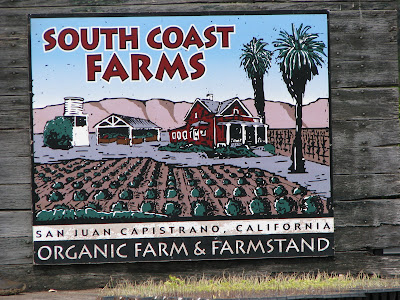

The Folks at the EC were kind enought to provide organic, locally grown oranges for snack! They also gave us yummy organic animal crackers.

Who says kids don't like to eat fruit!?

We recycled all of our cans and cups!

Max gave us a tour of their historic building - the oldest wooden building in San Juan, at 130 years old! Wood for the building was brought from the redwood forest. Foundation stones came from ruins of the San Juan Mission (the FIRST Mission in San Juan was destroyed in the 1812 earthquake). When the house was built there was only ONE building visible from the building's porch.

Evan told as all about the gardens - the Native plant gardens and the food gardens, that provide landscaping around the building. If you plant native plants you provide habitat for animals, reduce the need for water, and eliminate the need for fertilizers and pesticides.

Farmer Bill took the kids on a hike through the farm, showing them what watermelon looks like when they're still flowers, where seeds come from, and how compost helps the plants grow big and tall.

South Coast Farms is an organic farm, which means they do not use chemical pesticides. This little dude was muching a petal on this sunflower. In a non-organic farm, this guy would be a goner!


Peppers are green when they're young, and as they age they ripen to a bright red!
When people are young they have smooth skin. As they age their skin wrinkles and their hair turns gray.

South Coast Farms is one of the only organic farms in Orange County. You can enjoy fruit & veggies grown at the farm by visiting their farm stand, or participating in their Community Supported Agriculture Program.



The kids made pots out of recycled newspaper, then planted seeds to grow at home.

This garden helps save water, because the plants are native and they are adapted to our climate and geography.

The kids really seemed to enjoy playing with the soil!

This garden is landscaped with edible plants!

Making newspaper pots.



Bean seeds or pumpkin seeds were planted in our pots.

The site where the garden now grows was once a pumpkin patch! Volunteer pumpkins still sprout randomly throughout - and are allowed to grow to maturity.


Inside the old farmhouse with Max.




























